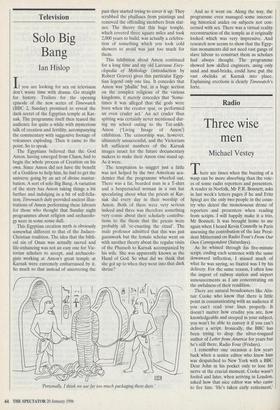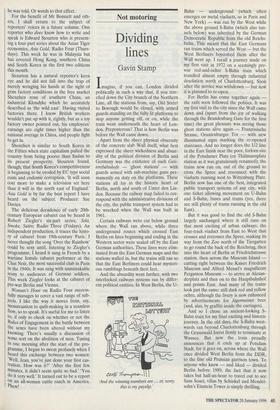Radio
Three wise men
Michael Vestey
There are times when the buzzing of a wasp can be more absorbing than the voic- es of some radio reporters and presenters. A reader in Norfolk, Mr P.R. Bonnett, asks in last week's letters pages if he and Fritz Spiegl are the only two people in the coun- try who detest the monotonous drone of reporters and presenters when reading from scripts. I will happily make it a trio, Mr Bonnett. It was brought home to me again when I heard Kevin Connolly in Paris assessing the contribution of the late Presi- dent Mitterrand on Radio Four's From Our Own Correspondent (Saturdays).
As he whined through his five-minute script, ending each sentence with the same downward inflection, I missed much of what he was saying, so fixated was I by his delivery. For the same reason, I often lose the import of railway station and airport announcements as I am concentrating on the awfulness of their rendition.
There are natural broadcasters like Alis- tair Cooke who know that there is little point in communicating with an audience if you can't read your lines properly. It doesn't matter how erudite you are, how knowledgeable and steeped in your subject, you won't be able to convey it if you can't deliver a script. Ironically, the BBC has been trying to drop the silver-tongued author of Letter from America for years but he's still there, Radio Four (Fridays).
I remember one occasion a few years back when a senior editor who knew him was despatched to New York with a BBC Dear John in his pocket only to lose his nerve at the crucial moment. Cooke wasn't fooled and later, when arriving in London, asked how that nice editor was who came to fire him. 'He's taken early retirement,' he was told. Or words to that effect.
For the benefit of Mr Bonnett and oth- ers, I shall return to the subject of reporters' voices in a future column. One reporter who does know how to write and speak is Edward Stourton who is present- ing a four-part series about the Asian Tiger economies, Asia Gold, Radio Four (Thurs- days). This week he was in Malaysia but has covered Hong Kong, southern China and South Korea in the first two editions this month.
Stourton has a natural reporter's keen eye and he did not fall into the trap of merely wringing his hands at the sight of grim factory conditions in the free market Shenzhen zone of southern China, an industrial Klondyke which he accurately described as 'the wild east'. Having visited factories there, I know British workers wouldn't put up with it, rightly, but as a toy factory owner pointed out, his employees' earnings are eight times higher than the national average in China, and people fight to get in.
Shenzhen is similar to South Korea in the Fifties when state capitalism pulled the country from being poorer than Sudan to its present prosperity. Stourton found, though, that South Korea's competitiveness is beginning to be eroded by EC type social costs and endemic corruption. 'It will soon cost more to make a television set here than it will in the north east of England.' Asia Gold is by far the best report I have heard on the subject. Producer: Sue Davies.
The delicious decadence of early 20th- century European cabaret can be heard in Robert Ziegler's six-part series, Sekt, Smoke, Satire, Radio Three (Fridays). An independent production, it traces the histo- ry of cabaret from 19th-century Paris. I never thought the song 'Over the Rainbow' could be sexy until, listening to Ziegler's programme, I heard it sung in French by a wartime female cabaret performer at the Chat Noir, the most successful club in Paris in the 1940s. It was sung with unmistakable irony to audiences of German soldiers. This week Ziegler looks at the cabaret of pre-war Berlin and Vienna.
Woman's Hour on Radio Four success- fully manages to cover a vast range of sub- jects. I like the way it moves from, say, Menstruation to quilt-making in a seamless flow, so to speak. It's useful for me to listen to, if only to check on whether or not the Rules of Engagement in the battle between the sexes have been altered without my knowing. There's usually a discussion of some sort on the abolition of men. Tuning in one morning after the start of the pro- gramme, I began to sweat profusely when I heard this exchange between two women: Well, Jean, you've just done your first cas- tration. How was it?' After the first few minutes, it didn't seem quite so bad.' You do it very well.' It turned out to be a report on an all-woman cattle ranch in America. Phew!



























































 Previous page
Previous page